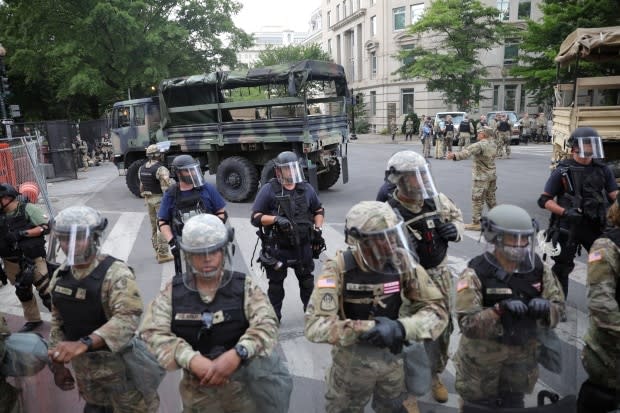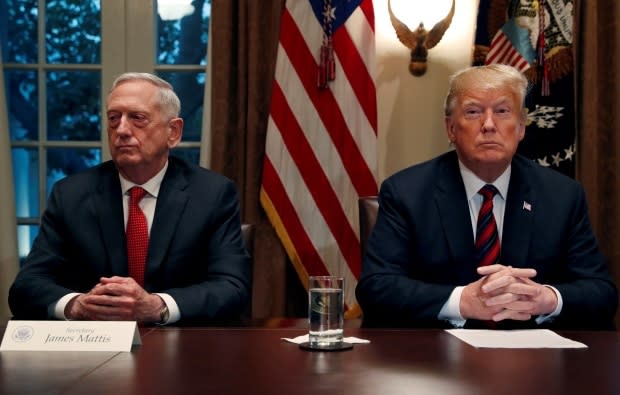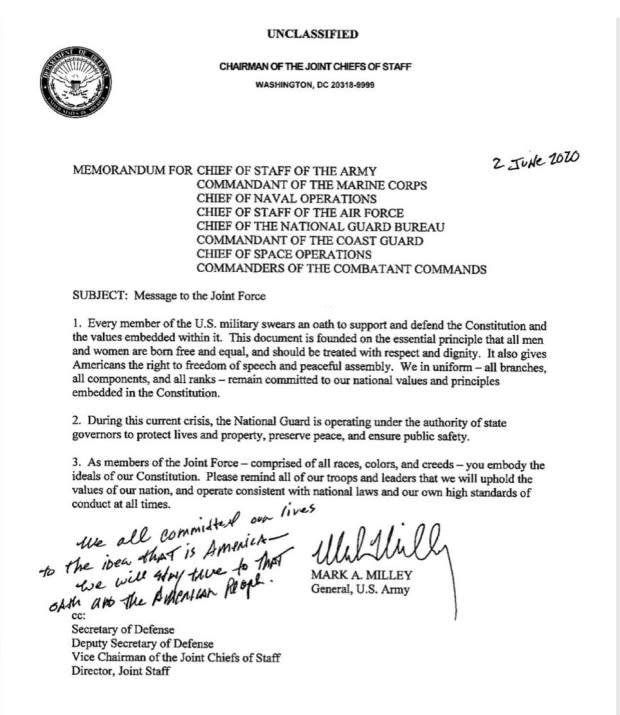Why military men pushing back on Trump is an 'extraordinary' event in American democracy

An aberrant event in the life of the American republic unfolded this week in the haze of flash-bang grenades, tear gas and fires.
In one of the world's oldest continuing democracies, past and present military officials pushed back on a president talking about deploying troops on U.S. soil.
"It's really extraordinary," said Richard Kohn, a University of North Carolina military historian who studies civilian control of the military.
"This is quite unusual in terms of historical context."
What unleashed the discord was President Donald Trump's threat to use the military to quell violence stemming from protests against racism and police brutality in many U.S. cities.
WATCH | Trump threatens to use the military against protesters:
Trump said in a statement Monday that he wanted state governors to take measures to "dominate" their streets. If they failed, he said he would deploy the military and "quickly solve the problem for them."
White House staff said Trump was prepared to apply the Insurrection Act of 1807 — which has not been used since 1992, and has only rarely been invoked without state governors' consent.
Trump's defence secretary, Mark Esper, referred to U.S. cities as battlespaces in a phone call with state governors on Monday.
That same day, the joint chiefs chairman, Gen. Mark Milley, appeared on the streets of Washington, D.C., in military fatigues.

It's rare enough for active-duty troops to be deployed at home — it has occurred, on average, about once every generation, and hasn't happened since the 1992 Los Angeles riots.
Rarer still was the barrage of repudiation of Trump's idea that struck within hours. Letter after letter made clear the wide-ranging displeasure within military circles over this potential deployment.
"It is not unprecedented to have civil-military friction within an administration," said Peter Feaver, a civilian-military relations expert at Duke University.
"Every administration has them. But there are distinctive features of this one, particularly its coinciding with a tight re-election campaign."
What the generals said
The most explicit statements came from retired brass.
Perhaps the starkest warning came from retired general John Allen, who warned in Foreign Policy magazine that this might be the beginning of the end of American democracy.
An ex-chairman of the joint chiefs, retired navy admiral Mike Mullen, wrote in the Atlantic magazine that he was "sickened" by the use of force on protesters before a Trump photo op in Washington.
Trump's first defence secretary, retired general James Mattis, said he was "angry and appalled," and cast his former boss as a menace to the constitutional order.

Active military leaders joined in on the criticism — some more explicitly than others.
Esper appeared to moderate his tone by mid-week. He made a striking public comment Wednesday against the use of active-duty troops at home, saying he opposed such a measure.
Milley also released a letter Wednesday to military command stressing their oath to the constitution and its embedded values of racial equality, free speech and peaceful assembly.

Then came similar letters from, among others, the chief of the National Guard Bureau, the chief of naval operations, the chief of staff of the air force, the secretary of the army, and the commandant of the marine corps, some of whom expressed support for protesters.
The historical context
Military figures occasionally publicly criticize the civilian government, said Lindsay Cohn, who specializes in civilian-military relations at the U.S. Naval War College in Newport, Rhode Island.
She cited a couple of examples — military complaints about gay-rights policy in the early 1990s and about the Iraq war strategy in 2006.
But she struggled to think of a precedent for an open argument about whether to deploy soldiers on American soil.
That excludes a long-ago, exceptionally dark chapter in American history: the Civil War.
One of Abraham Lincoln's generals, George McClellan, brushed off his attack orders and eventually ran for president against Lincoln in 1864.
In another restive moment in U.S. history, presidents Dwight Eisenhower and John F. Kennedy took the rare step of deploying federal troops against the will of states, sending soldiers to southern states to enforce civil rights.
Where do we go from here?
State governors have not asked Trump for federal troops, and he hasn't forced the issue so far.
However, in one place the president does control — and where there is no state government — Washington, D.C., several hundred troops were deployed this week. They have reportedly been sent home.
Four civilian-military relations experts contacted by CBC News agreed on one big question stemming from this week — and disagreed on another.
They all expressed regret that Trump had put the military in this position, forcing it into a political dispute.
Cohn said military officials have been forced between a rock (being used as "political pawns") and a hard place (appearing to speak out and sound political).
Where the experts disagreed was whether American democracy is in danger.
"I would say American democracy is definitely at a crisis point right now," Cohn said, explaining that this week's controversy is just one example of the country's heated politics.
Stephen Saideman, a civilian-military relations expert who once worked at the Pentagon, said he's very worried.
He noted Trump's history of calling elections rigged — Trump did it repeatedly in 2012 when Barack Obama was re-elected (on Twitter, he called for a revolution); he did it in 2016 before he won; and he's now trying to cast doubt on the legitimacy of mail-in ballots.
"We already have the seeds being sown about whose job it's going to be to eject a defeated president from the White House. Which is not a conversation the United States has had — ever — as far as I can recall," said Saideman, director of the Canadian Defence and Security Network, based at Carleton University in Ottawa.
"Norms take a long time to develop. And a short time to destroy."
Kohn is less worried about America's democratic institutions.
"I've seen the courts push back [on Trump]. I've seen the American people, the polling, the 2018 election. … While he's knocked down quite a few guardrails, the fundamentals are still there," he said.
"As a historian of the United States, I think our institutions are more resilient and more deeply rooted than people think."


